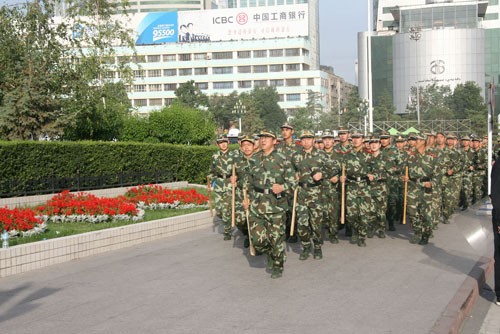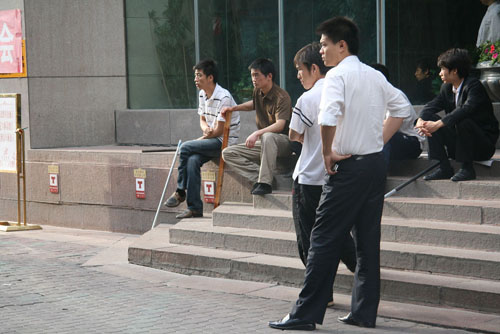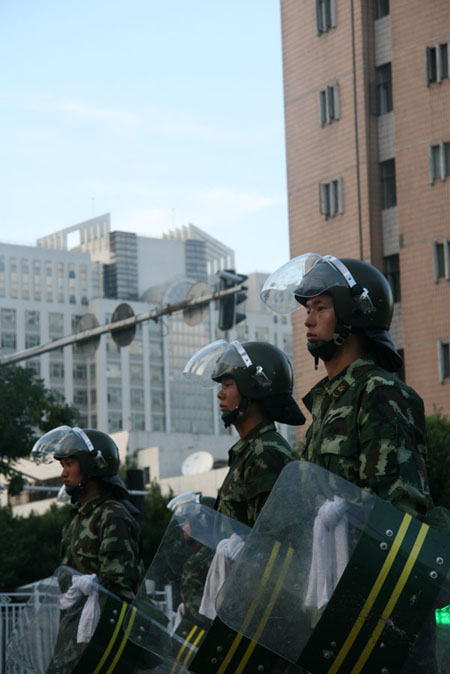By John Sexton
China.org.cn reporter in Urumqi
Following Sunday night's violence in Urumqi in which 156 people died, and mass demonstrations by Han Chinese residents of the city on Tuesday, the Xinjiang authorities have imposed a curfew in the regional capital and put it under effective lockdown.
|

|
|
Riot control troops march out of People's Square in Urumqi, capital of the Xinjiang Uygur Autonomous Region, on Wednesday, July 08, 2009. [John Sexton, China.org.cn] |
People's Square in the center of Urumqi has been turned into a temporary base of the People's Armed Police. The square, adjacent to the Xinjiang regional headquarters of the Communist Party of China, and to the hotel housing the press covering the unrest, was the scene of some of Sunday's bloody clashes, which the authorities are blaming separatists among the Uygur ethnic group.
Around 8:30 am on Wednesday, columns of troops, shouting slogans, marched out of the square to deploy around the city. Most were armed with heavy wooden staves, and some units included teams of dog-handlers leading German Shepherds. A pair of military helicopters repeatedly circled overhead. Some time later, several water cannon trucks and armored cars drove out of the square.
It seems that many troops are being deployed along what amounts to a "peace line" sealing off a largely Uygur area in the south of the city where much of Sunday's violence took place. On our way back to our hotel from a press tour of the area, we were turned back by troops carrying rifles with fixed bayonets. Parallel streets were also blocked, some by armored cars. The roadblocks appeared to be an attempt to protect the people of the area from revenge attacks.
 |
|
Hotel workers arm themselves with makeshift weapons in Urumqi, capital of the Xinjiang Uygur Autonomous Region, on Wednesday, July 08, 2009. [John Sexton, China.org.cn] |
Several witnesses told us that, on Tuesday, thousands of Han Chinese took to the streets, singing the national anthem, chanting "Unity is Strength" and "Down with Rebiya," – a reference to Rebiya Kadeer, the leader of the émigré World Uygur Congress. Some of the demonstrators were armed with staves, some with machetes and cleavers. It seems that some in the crowd, intent on attacking Uygurs in revenge, attempted to enter the southern area of the city.
"Yesterday, people from minority nationalities did not dare leave their homes," said Liu Jianrong, general manager of a local news website.
Later on Tuesday, regional Party Secretary Wang Lequan went on television to announce a 9:00 pm to 8:00 am curfew in Urumqi. Public access to the Internet access has also been blocked.
On Wednesday we saw no large crowds, but in some places there were small groups of civilians armed with clubs. Just a couple of hundred meters west of People's Square I came across a makeshift checkpoint set up by staff from a nearby hotel. Around 20 cooks and bell-boys had armed themselves with wooden staves, metal bars and at least one machete.
|

|
|
Riot control troops guard the headquarters of the Xinjiang Regional Committee of the Communist Party of China in Urumqi on Wednesday, July 08, 2009. [John Sexton, China.org.cn] |
When I asked them why, with hundreds of troops a short distance away, they felt they needed to arm themselves, the hotel manager simply replied "You should be able to work out the answer yourself." He insisted that the staff were from "all ethnic groups" and were "sticking together."
In the southern, mainly Uygur area, many people were on the streets and small food shops and restaurants were open, although most of the larger businesses seem to be closed. As in other districts, troops and police were stationed every few hundred meters, and we saw no disturbances. One of the city's main landmarks, the recently re-developed Da Bazha (Big Bazaar) was occupied by troops who had taken up positions on its roof.
We arrived in Urumqi Tuesday evening on the same flight as a group of around a dozen Taiwanese tourists wearing Cowboy hats, including a ten-year-old boy wearing a Stars-and-Stripes bandanna. They told us they were on their way to a 10-day horse-riding holiday in the nearby mountains. Their travel agent, they said, had assured them that order had been restored and the situation in Xinjiang was now entirely secure.
Unfortunately, it seems it will take more than 10 days for life to return to normal in Urumqi.
(China.org.cn July 8, 2009)